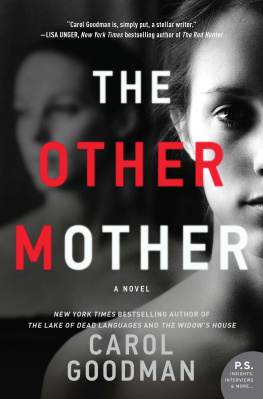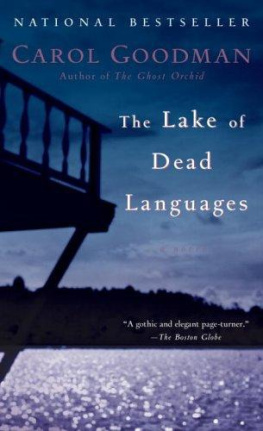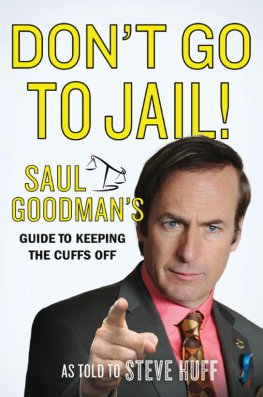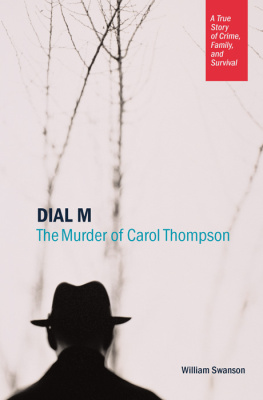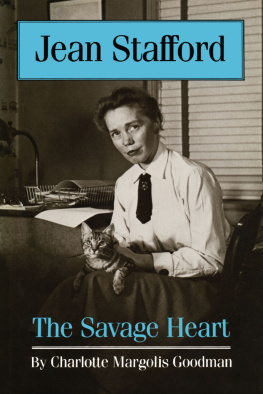Carol Goodman - Arcadia Falls
Here you can read online Carol Goodman - Arcadia Falls full text of the book (entire story) in english for free. Download pdf and epub, get meaning, cover and reviews about this ebook. publisher: Ballantine Books, genre: Detective and thriller. Description of the work, (preface) as well as reviews are available. Best literature library LitArk.com created for fans of good reading and offers a wide selection of genres:
Romance novel
Science fiction
Adventure
Detective
Science
History
Home and family
Prose
Art
Politics
Computer
Non-fiction
Religion
Business
Children
Humor
Choose a favorite category and find really read worthwhile books. Enjoy immersion in the world of imagination, feel the emotions of the characters or learn something new for yourself, make an fascinating discovery.

- Book:Arcadia Falls
- Author:
- Publisher:Ballantine Books
- Genre:
- Rating:3 / 5
- Favourites:Add to favourites
- Your mark:
- 60
- 1
- 2
- 3
- 4
- 5
Arcadia Falls: summary, description and annotation
We offer to read an annotation, description, summary or preface (depends on what the author of the book "Arcadia Falls" wrote himself). If you haven't found the necessary information about the book — write in the comments, we will try to find it.
Arcadia Falls — read online for free the complete book (whole text) full work
Below is the text of the book, divided by pages. System saving the place of the last page read, allows you to conveniently read the book "Arcadia Falls" online for free, without having to search again every time where you left off. Put a bookmark, and you can go to the page where you finished reading at any time.
Font size:
Interval:
Bookmark:
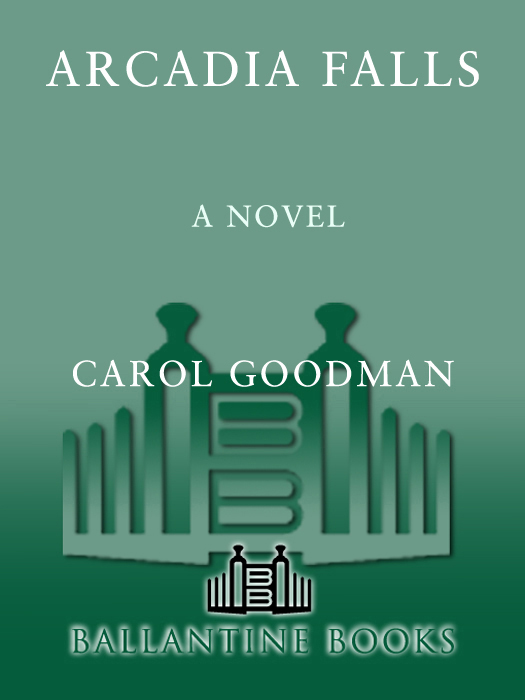
The Night Villa
The Sonnet Lover
The Ghost Orchid
The Drowning Tree
The Seduction of Water
The Lake of Dead Languages
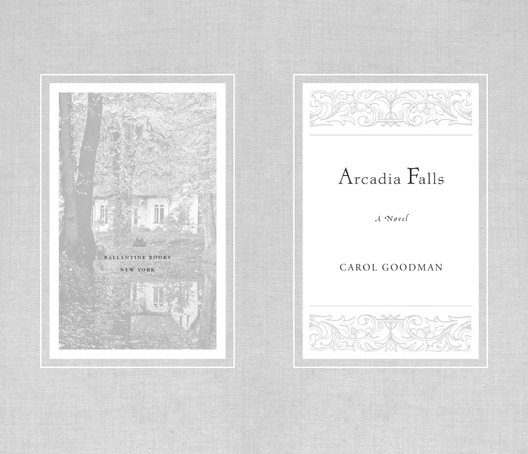
For Andrew and Katy
Thanks to my first readers: Gary Feinberg, Scott Silverman, and Nora Slonimsky. Lisa Huber was especially generous in sharing her knowledge as a folklorist.
Thanks to my agent, Loretta Barrett, and her associate Nick Mullendore for making it possible for me to write; to my inestimable editor, Linda Marrow, for her insight and friendship; and to all the people at Ballantine whose care and efforts made this book possible: Gina Centrello, Elizabeth McGuire, Kim Hovey, Dana Isaacson, Brian McLendon, Lisa Barnes, and Junessa Viloria.
Finally, I couldnt have written this book without the love and support of my familymy mother, Marge Goodman, my husband, Lee, my brothers, Bob and Larry, my niece and nephew, Andrew and Katy, and my step-daughter and daughter, Nora and Maggie.

W ere lost, my daughter tells me for the third time in an hour. I told you we should have gotten GPS. Lexys mother has it and they never get lost.
Were not lost, I reply, biting back the urge to tell Sally that one, we can no longer afford the things Lexys mother can, and two, the only places Lexys mother drives to are the Americana shopping center and the hair salon, two destinations within a five-mile radius of their Kings Point home, and so she is not likely to get lost. Instead I say: Were taking the scenic route.
Sally rolls her eyes, throwing her head, neck, and shoulders into a gesture so practiced it has attained the grace of a yoga asana. I told her this a few weeks ago, making a joke of it. It was the kind of thing she and I used to joke about: eye-rolling teenagers. Instead of laughing, she asked me with exaggerated patience not to try to be funny anymore. And would I please stop comparing everything to yoga, she added as she plugged her iPod buds into her ears.
Scenic would imply that we were able to see something. How remote is this place?
Its only two and a half hours to the city.
Theres a train? Sally asks, stretching her neck and sniffing as if scenting the air for freedom. When she sits up straight you can see how lovely she islike an exotic wading bird craning its long neck.
Well, no, I dont think so. There might be a bus.
Oh, Sally says, slouching back into her more characteristic slump. She pulls her long legsin the prefaded jeans that cost more than the rent on my first apartmentup to her chin and plugs in her iPod. Great. A bus. I may as well have suggested she take a coach and four. Good thing. The last thing I want is Sally running off to the city.
She has a point about the limited visibility of this scenic drive, though. As soon as we got off the highway a low-lying fog had settled on either side of the narrow two-lane country road snaking up into the mountains. I could point out that she used to like fog, that I used to wake her up early on foggy mornings so I could walk her to school. Wed pretend that we were lost in the woods. Id be Hansel to her Gretel, the Woodsman to her Little Red Riding Hood. She liked the idea of being lost. Her favorite stories were about children lost in the woods and the tricks they used to find their way homebread crumb trails and yarn unraveled from sweater cuffs. It was a game you could enjoy when you knew what the ending would be: a lighted cottage window shining through the dark, all disfiguring spells broken, and the world restored to what it should be. I couldnt blame her for losing faith in that kind of storybook ending.
It isnt much fun being really lost, which we are now. Although I printed out the directions from the schools website, theyd seemed a little unclear to me. When I called for clarification, Ivy St. Clare, the dean, had laughed. Oh, we consider it part of the application procedure. Only those who can find Arcadia belong here. Then she had gone on to give a series of impressionistic route suggestions. By all means take the scenic route that follows Wittekill Creek. Turn right when you see an old decrepit barnyoure a mile from the school when you see thatand then up a steep hill and past the apple orchard where we used to have concerts on summer evenings. Then she had gone into a ten-minute reverie on the days when the Arcadia School was still an arts colony with famous musicians, poets, and painters who all collaborated (a word she used frequently and invested with some magical import). Even Virgil Nash, the famous painter and one of the first teachers at the colony, had played the mandolin. Over the phone, Id had to listen to a long anecdote about Virgil Nash and some women potters before getting a momentary chance to ask her what I did after we passed the apple orchard (Turn left at the sign of the White Witch). I have the directions on a Post-it note affixed to the dashboard (Poor mans GPS, I quipped to Sally earlier, forgetting her banning of jokes), but they wont do me much good if I cant see the orchard or the sign.
Do those look like apple trees? I ask, not really expecting a response from my plugged-in daughter. She gives herself away, though, by glancing out the window at the hobble-branched shapes looming out of the fog on the left side of the road.
Hey, she says, peeling the buds out of her ears, those remind me of that story you used to read to me when I was little. Trees like gnomes on crutches marching through the mire.
They are those trees, I say, trying to keep my voice flat. Enthusiasm, another emotion under interdiction, is a surefire way to scare off any nascent curiosity in Sally. Im thrilled, though, that she remembers the story. Remember, I told you that the two women who wrote and illustrated the story, Vera Beecher and Lily Eberhardt, lived here.
Oh yeah, the lesbians youre writing about.
We dont know that they were lesbians, honey, I point out, wondering what her current stance on lesbianism is. Last year there was a flurry of nervous e-mails among the mothers of Sallys friends about a new trend in bisexual experimentation, which basically boiled down to Jessica Feingold having made up a story about two girls making out at her Sweet Sixteen. When I asked Sally about it, she dismissed the whole incident as fallout from a recent TV episode, which featured two girls kissing. Then she told me I was no longer allowed to use the words sexuality, gender, or making out.
Unmarried women often lived together back then. Thats how the art colony was started. Some women artists from the city banded together to live up here so that they could work as artists instead of having to get married and spend their time raising families. I pause, wondering if Ive just made it sound like having children and pursuing an artistic career are mutually exclusive and how I could explain that back thenin the twenties and thirtiesthey often were. These women met at an art school in New York and decided they could pursue careers as artists better if they didnt marry. One of them, Vera Beecher, offered her family estate. Then a bunch of other artists joined them
Font size:
Interval:
Bookmark:
Similar books «Arcadia Falls»
Look at similar books to Arcadia Falls. We have selected literature similar in name and meaning in the hope of providing readers with more options to find new, interesting, not yet read works.
Discussion, reviews of the book Arcadia Falls and just readers' own opinions. Leave your comments, write what you think about the work, its meaning or the main characters. Specify what exactly you liked and what you didn't like, and why you think so.

